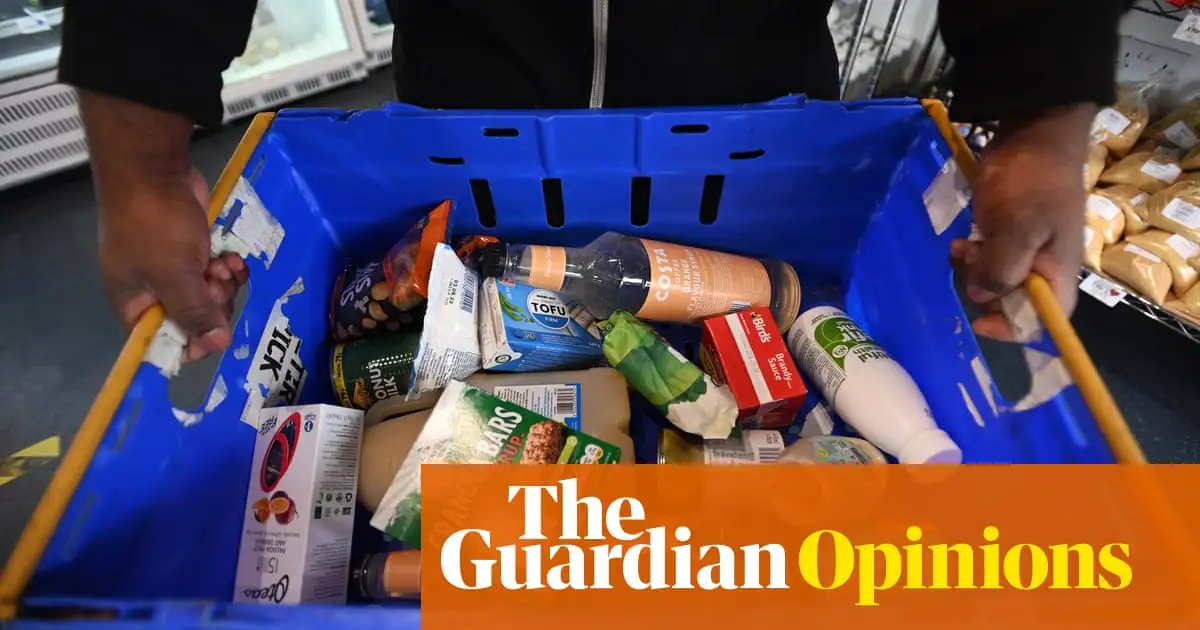As honeymoon periods go, Keir Starmer’s has been mostly chocolates and flowers. Over the first 10 days in office, the new prime minister has been gifted a jump in personal poll ratings, a Nato summit, and the rare national optimism that comes with England making it to a Euros final.
On Wednesday, though, watch out for the first marital row. As the government sets out its inaugural king’s speech, a Labour backbencher, Kim Johnson, will throw the leadership a test: an amendment calling for the two-child benefit limit to be scrapped.
The policy was a conspicuous absence in the party’s election manifesto, and pressure is mounting on Starmer to repeal the 2017 cut, as figures last week showed a record 1.6 million children have now been hit by the policy, with a staggering 93% of affected parents less able to afford food.
[…]
That the chancellor, Rachel Reeves, will reportedly use Wednesday to enshrine her “fiscal rules” on borrowing into law – a plan that is widely seen as at best, arbitrary and at worst, nonsensical – will only deepen the cracks. The message to restless backbenchers is loud and clear: there is no room in the king’s speech to commit to feeding hungry children – but plenty for rules that’ll make it harder to raise the cash to do it.In many ways, Labour’s stubbornness over the two-child limit shows the stranglehold “fiscal responsibility” has over future policy. At this point, the doctrine is less a helpful bit of discipline and more reminiscent of a cult, a dead-eyed chant that increasingly blinkers the leadership from common sense. Under this hyper self-restraint, even a highly cost-effective move that would quickly lift hundreds of thousands of children above the breadline is dismissed. What’s left is a shallow senselessness: a “child poverty” strategy that refuses to scrap a key driver of child poverty.
[…]
From bankrupt councils to NHS waiting lists and overcrowded prisons, Labour is effectively in a state of cognitive dissonance: it acknowledges the scale of the crises that the party has inherited from the Conservatives and is positioning itself as the fixer, but falls short of committing to spend the money needed to do it. Starmer’s recent pledge to give Ukraine £3bn a year “for as long as it takes” shows there is money available if the government chooses to find it. Not all spending is treated equally: to some, using resources to boost health or the benefits bill is wasteful, while funding defence is prudent.In lieu of injections of cash, Labour is focusing on “reform” as a means for renewal: from rights for workers to the deregulation of housebuilding and an emphasis on preventive healthcare. That’s fine. But in politics, much like in life, there really are some problems that can only be solved by writing a cheque.
The electorate, tired of a country where nothing seems to work any more, appear to understand this more than those they’ve elected. The latest Ipsos poll shows that of people who voted for Labour this month, more than three-quarters expect the government to spend more on public services, as well as improve living standards for people on low incomes.
The quirk of Starmer’s majority is that he has at once a strong mandate and no real mandate at all. A manifesto designed to be as unthreatening and vague as possible was effectively a Rorschach test: voters saw what they wanted to see. The many non-voters, meanwhile, saw nothing at all. As prime minister, Starmer – managerial, efficient and nonideological to the point of pride – is a political blank canvas, a mood board for the public to project their varied expectations on. That hope is in limited supply and cynicism high does not mean there is not a deep desire out there for change. Few people voted for more food banks.
In the coming months, when the public grow impatient and the honeymoon period starts to wane, Starmer will have to make his peace with taxing the super-rich, borrowing or both. The alternative is a rudderless society, perpetually stuck in the ashes of Conservative decline, and a Labour party losing ever more alienated voters to the Greens, independents or Reform. Winning power is one thing, knowing what to do with it once you have it is quite another.
He doesn’t need to ‘find’ money, its a bullshit excuse made to make people think the Government can’t do anything. He doesn’t want do it, that’s the reason, its not a financing problem.
You are technically correct. Best kind.
But it is also a problem of convincing voters. Something modern right wing labour has chosen not to do. And in fairness, fptp makes hard as only 30% of voters believing right wing ideals can turn the election.
I mean, it is a finance in so much as how you choose to fund things matters. Spending money not replaced with income has a cost, long or short term. And choosing to eat that cost is a fiscal decision.
Be that cost weaker currency o trade with 3rd party nations or a lack of trust from voters next election so not having the time to implement solutions. Or spending time effort and money convincing voters of economic realities so they trust you long enouth to see improvement. While those who benifit from the current system are using that power to disavow your party.
I mean, it is a finance in so much as how you choose to fund things matters. Spending money not replaced with income has a cost, long or short term. And choosing to eat that cost is a fiscal decision
it really doesn’t, the Government is the only sector which can continuously run deficits. U.K. has run continuous deficits (though clearly not enough and not to the right people). Almost Every country runs deficits long term (except developed countries with external surpluses like Norway), nothing wrong with that. China has a massive trade (current account) surplus yet they also run massive fiscal deficits. They know the only way for the country to grow and develop is with Government spending. Financial cost isn’t real cost.
I would argue they should just create the money without issuing debt because the interest on debt mostly goes to financial asset holders who are rich, you can see this in the U.S. with the higher interest rates is stimulating demand instead of reducing it. The capitalists don’t want the Government to spend without issuing debt, Government debt is a way for them to park their wealth in a risk-free asset and earn an interest at the same time.
Be that cost weaker currency o trade with 3rd party nations
This is only partly true. Yes, if the British Government decides to rid themselves of the shackles put on them by the capitalists and spend without issuing debt, there will likely be capital flight (since UK relies on other bringing foreign currency and working like a tax-haven) and exchange rate depreciation which could result inflation. But the Government can use capital controls, many developing countries do, China does it very effectively for instance.
Also keep in mind a weaker currency isn’t inherently bad. It discourages imports of foreign luxury goods. U.K. has kinda fallen off on manufacturing so I don’t know how much export-promotion would occur because of this.
Regardless of how the Government spends the ‘markets’ won’t like it. They could try taxing the rich and only afterwards increase spending to keep fiscal deficit (as %) low but then too there may be capital flight. They could issue debt and provide corporate welfare then also the markets won’t like it. The best solution imo is to spend without issuing debt (this doesn’t cause inflation, that’s neoliberal propaganda), impose strict capital controls and then go ‘deal with’ the rich.
But it is also a problem of convincing voters. Something modern right wing labour has chosen not to do. And in fairness, fptp makes hard as only 30% of voters believing right wing ideals can turn the election.
I completely agree with u on this.
All other things you say are still about fiscal choice. We can run continuing deficit but it is not free. The very value of our currency is effected. Meaning we have to do so while building 3rd party nations rust in our value for trade.
Only a totally independent nation can ignore those actions. And not only are we a long way from that. Not just oil that we can with work be replaced but food etc. And honestly replacing our dependence on 3rd party nations for food. Requires very expensive reconsiderations on our land use. As not all land is suitable. Our cities have expanded into the areas that are most suitible for growth. So again another huge cost that must be considered.
China took a bloody long time to build its economy. It was pretty poor back in the 70s to 80s. As it was just beginning to build a dependence on its cheap manufacturing. It is that dependence now that allows it to more or less ignore 3rd nation lack of trust. And far from good for its citizens.
So as I say it all comes down to fiscal conditions at some point. Chinas lack of a real democracy helped it. Not to mention having huge resource availability that became useful in the age of electronics.
While our democracy really only vaguely earns the name. It does limit how long even a huge majority win can take to make radical changes.
I completely agree with u on this.
Yeah, and honestly it really is the hardest issue to address. Almost all the negatives I point out, no matter the solution involved, boil down to needing a public backing. I have 0 desire to live in nations like China and Russia, where democracy is even more of an act than our own. Any change requires selling to the public. But honestly while fiscal interests have such huge control of our media etc. There does not seem to be a peaceful solution.
I didn’t realise that the bill which capped child benefits at 2 children was only actionable for any children born after the bill came into law. I’d been imagining that it was a barbaric cut-off where people on benefits with more than 2 children suddenly found their benefits being viciously slashed but apparently it does not apply retrospectively.
I’m not sure about it anymore. It sounded completely draconian before but the way it’s been implemented sounds a lot more fair than the media are portraying it.
Ideally the cap shouldn’t exist but I can imagine other issues that are more pressing for the government to allocate funding to given the squeeze the entire country is feeling at the moment.





